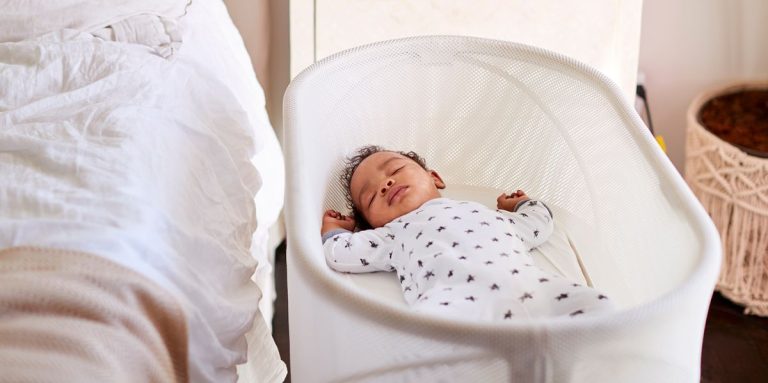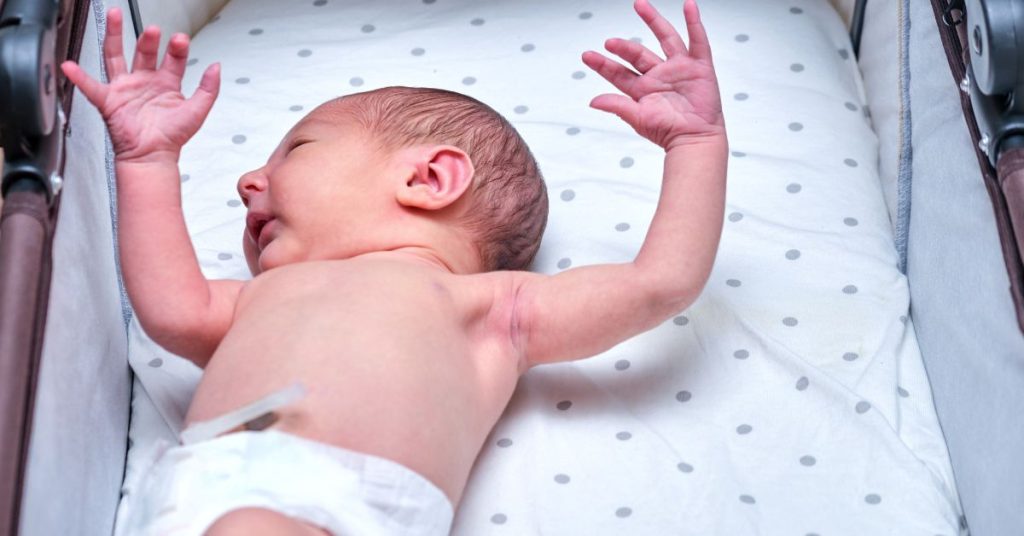
Baby Refusing to Sleep in Bassinet? Here are the Causes and Solutions
- Created:
15. 12. 2022 - Updated:
15. 2. 2024
There’s no denying it:
Watching your baby sleep in the bassinet while snuggling can be so joyful. Plus, it provides you the chance to do other things, like grabbing some sleep of your own.
But this is not always the case as babies sometimes refuse to sleep for some obscure reason. This can be so nightmarish for the parents, especially when in the middle of the night.
That said:
Let’s find out the causes and solutions to this problem.
Why Your Baby Won’t Sleep in the Bassinet ?
If you find that your baby is refusing to sleep in the bassinet, here are the most likely reasons and their solutions:
Baby is Uncomfortable
Even as an adult, you’ll find it very difficult to sleep or rest when uncomfortable. So for babies, it shouldn’t be any different.
You see:
Some things can make your baby uncomfortable in the bassinet. This includes the wrong room temperature, a dirty diaper, and reflux.
Wrong Room Temperature
This is one of the most common reasons babies refuse to sleep in the bassinet or anywhere else. Simply put, your baby is unlikely to sleep if the room is too cold or too hot.
Solution:
Ensure that the temperature is just right so they neither shiver nor sweat. Several studies have shown that the ideal room temperature for babies is between 68 to 72 degrees Fahrenheit.
Also, your baby’s sleeping costume must match the temperature. In warm temperatures, go for short sleeve clothing or breathable pajamas.
However:
If it’s cold, a long sleeve bodysuit or footed pajamas should do.
Dirty Diaper
It is hard for babies to grab some sleep if they have poop or urine in their diapers. It makes them so uncomfortable.
Solution:
Before you lay your baby down, check the diaper for any signs of poop and urine. Change the diaper if you find any signs.
Baby Has a Reflux

Reflux is a situation whereby the baby regurgitates as food moves back up from the stomach. It can be very uncomfortable and can rob your baby of any sleep.
It is mainly caused by wrong positioning during feeding. Reflux can happen anytime, including when your baby is awake and playful, but it is mostly common when they lie down.
Solution:
Since the wrong feeding position causes reflux, you must learn how to feed your child. Experts recommend feeding babies upright and sitting them for about 20 to 30 minutes after feeding.
In addition:
Try burping them often before bedtime.
Baby is Used to Sleeping in Your Arms

“Baby only sleeps when held.” Surely, we’ve all heard this from many new parents. But what’s the reason behind this?
Well:
That’s because the baby must have been sleeping in your arms for a long time and has become used to it. Thus Preferring it to the bassinet, which is recommended by the American Academy of Pediatrics (AAP) for newborns.
Solution:
Start laying your baby down when they’re still awake or on the verge of sleep. When you do this continuously, the baby learns that the bassinet is for sleep and gradually gets accustomed to it.
Remember:
This is not an immediate solution for divorcing your baby from sleeping in your arms. It may be totally unsuccessful the first few times you try it, but you’ll have to continue.
Changes will come eventually.
Your Little One has Experienced a Startle Reflex

Otherwise known as the Moro reflex:
The startle reflex causes infants to feel like they’re falling. In response, they look startled and spread their arms sideways, signalling that you must carry them.
It is completely normal for infants until they reach 3 to 4 months.
That said:
Babies can experience the Moro reflex when they’re lowered into a bassinet.
Solution:
The easiest known way to decrease startle reflexes is to swaddle your baby.
Your Baby is Hungry
Know this:
It’s extremely difficult for babies to sleep in the bassinet or anywhere if they’re hungry. Even if they sleep, it’ll likely be for a short time before they wake up crying for food.
Solution:
Feed your baby and ensure they’re full and comfortable before laying them down to sleep.
Your Baby is Overtired
An overtired baby has been awake longer than its body can manage. Consequently, their body triggers stress response hormones like cortisol, preventing them from settling in the bassinet.
Here are a few signs that your baby might be overtired:
- Yawning
- Eye-rubbing
- Fussiness
- Crying
- Clumsiness
Solution:
It all comes down to figuring out your baby’s wake window. A wake window refers to the duration in babies can be comfortably awake before their next sleep.
Although babies are different, most of them have similar wake windows. For example, one or two-month old babies typically have a 1 to two- hour wake window.
Now:
Upon determining your baby’s wake window, you should always put them to bed within that period. That way, they won’t become overtired and resist sleeping in the bassinet.
Tips to Get Your Baby to Sleep in the Bassinet
Here are some additional tips you can apply to get your baby sleeping in the bassinet:
- Massage your baby regularly, as it can help them relax better and fall asleep faster.
- Close the curtains to block daylight. Babies naturally love sleeping in dark environments as it resembles the womb.
- Use sound machines that make white noise. White noise is similar to the noise in the womb, making babies feel more comfortable.
- Don’t be quick to attend to babies when they make noise. In many cases, the crying and groaning are brief and should be ignored. If you try carrying babies for every sound they make, they may not settle back to sleep.
Final Tip: Annie Baby Monitor – Your Baby Sleep Solution Helper
If your baby won’t sleep in the bassinet, Annie Baby Monitor can be your best friend to help you figure out what’s going on and improve the sleep routine.
Use its helpful features – baby monitor, sleep history, baby tracker – to check what’s happening around your baby and what could be causing discomfort or distractions.
Annie gives you some smart ideas to help you customize the sleep schedule to suit your baby’s needs so the baby can sleep soundly in the bassinet.

Annie Baby Monitor show you how to fix any issues and create a perfect sleep routine for you and your little one, so you both can sleep peacefully.
Conclusion
Ideally:
Your baby should be sleeping during nap time, and you lay them down in the bassinet. However, they can sometimes refuse to sleep for several reasons.
Luckily:
We know the causes and their solutions. Here they are:
- Baby might be uncomfortable. So, ensure the room temperature is right, change their dirty diaper and sit them upright when feeding
- Baby is used to sleeping in your arms. So start laying your baby down when they’re awake or on the verge of sleep
- Swaddle baby to reduce Moro reflexes and ensure they’re well-fed before laying them down
- Baby may be overtired. So, figure out your baby’s wake window
And that does it.
If you have further questions on the topic, please use the comment section.
Frequently Asked Questions About Why Baby Won’t Sleep in Bassinet
What Do You Do If Your Baby Won’t Sleep in the Bassinet?
Ensure that the room temperature is right, change their dirty diaper and keep them in an upright position when feeding. Also, swaddle your baby to reduce startle reflexes, feed them well and study their wake window.
What Do I Do When My Baby Only Sleeps When Held?
If your baby only sleeps when held, here’s what you should do. Start laying them in the bassinet when they’re still awake or drowsy.
By doing so continuously, they learn that the bassinet is actually for sleeping and get used to it instead of your arms.
Why Won’t My Baby Sleep in the Bassinet During the Day?
There are several reasons for this; they include the following: Overtiredness, under tiredness, hunger, bad sleeping schedule, and an unconducive sleep environment.









